11 Best SQL Books to Check Out (Spring 2023)
If you are looking to improve your skills and knowledge of Structured Query Language, we recommend you read in-depth the best SQL books. This is the best way to teach yourself the fundamentals of SQL.
What you will learn with these books are topics such as retrieving and manipulating data; making joins between tables; working with dates and times, advanced SQL statement techniques; grouping functions; basic math and statistics with SQL; table layouts; exercises with sentences to practice, and many more. Our Editor’s Choice, SQL: 3 books in 1, is a perfect guide for comprehensive study. Further, we’ll introduce you to 10 other great books for SQL as well, aimed at different levels of expertise and solving various tasks. We’ll also give you a guide to choosing the best books to learn SQL.
| Name | Nomination | Overall rating |
|
This is an in-depth but explanatory book is written for beginners and intermediate SQL language data scientists and enthusiasts and features plenty of practical exercises |
Editor’s Choice | 9.9 |
|
This is one of the best SQL books for beginners, providing a handy guide to managing, analyzing, and manipulating data with SQL |
Best for Beginners | 9.8 |
|
3. Learning SQL: Generate, Manipulate, and Retrieve Data The third edition of Learning SQL from Alan Beaulieu is a great option for data scientists who know a bit of the fundamental and want to progress |
Best for Intermediate Programmers | 9.8 |
|
This is one of the best programming books for novice and seasoned database professionals, containing information on the SQL database, how to control and maintain SQL |
Best Detailed Book for Beginners | 9.6 |
|
5. T-SQL Fundamentals (Developer Reference) Itzik Ben-Gan’s T-SQL Fundamentals is a reference book for developers who want to learn SQL language to allow the reader to quickly take charge of a relational database |
Best T-SQL Book | 9.4 |
|
6. Murach’s SQL Server 2019 for Developers This book is very comprehensive, well-illustrated, and written guide on SQL for intermediate and advanced developers with some background |
Best for Experts | 9.4 |
|
7. SQL in 10 Minutes a Day, Sams Teach Yourself Sams Teach Yourself from Ben Forta is a short book for those who want to learn the fundamentals or concepts of SQL programming in quick time |
Best for Learning from Scratch | 9.1 |
|
8. Practical SQL, 2nd Edition: A Beginner’s Guide to Storytelling with Data Anthony DeBarros’ Practical SQL Second Edition is a beginner-friendly yet fast-paced guide to SQL that covers a lot of ground |
Best Easy-to-Understand Book | 8.8 |
|
9. SQL for Data Analysis: Advanced Techniques for Transforming Data into Insights Not too bulky in size yet quite comprehensive, the book contains all you need to learn SQL as a beginner and shows the key steps needed for preparing data for analysis |
Best for Transforming Data to Insights | 8.7 |
|
10. SQL for Data Analytics: Harness the power of SQL to extract insights from data This book contains a lot of practical exercises for readers and includes various statistical techniques for analyzing data |
Best Comprehensive Book for Intermediate Developers | 8.6 |
|
11. The MySQL Workshop: A practical guide to working with data and managing databases with MySQL The MySQL Workshop is a very comprehensive book for starters and those who want to do their knowledge to become an intermediate data scientist and beyond |
Best for Database Developers | 8.5 |
Top 11 SQL Books Review 2023
Features:
- Author: Mark Reed
- Level of proficiency: Beginner/Intermediate
- of pages: 346
- Edition: July 10, 2022
- Publisher: Independently published
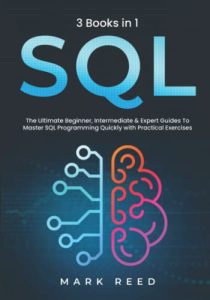
SQL: 3 books in 1 from Mark A. Reed, an American physicist, and professor at Yale University, is our Editor’s Choice of the best books on SQL. And why is it first on this list? It’s an in-depth but explanatory book that can take a beginner to the expert proficiency level in quick time. It features practical exercises for readers and is most especially written for beginners and intermediate SQL language data scientists and enthusiasts.
The writer Mark Reed is a senior software engineer and programmer. He has written quite a lot of best-selling programming books, from Python to C# and SQL. Reed is the author of more than 170 publications and 25 patents and has given more than 250 conferences. Reed received his Ph.D. in physics from Syracuse University in 1983.
What we liked
- Great for beginners and people with intermediate experience;
- It’s one of the best-selling books in Microsoft SQL server;
- Written by a bestselling author.
What could be better
- Nothing new for experts wanting to learn more.
Features:
- Author: Walter Shields
- Level of proficiency: Beginner/Intermediate
- of pages: 249
- Edition: Illustrated edition (November 18, 2019)
- Publisher: ClydeBank Media LLC
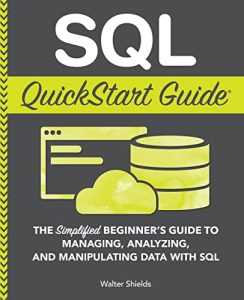
SQL QuickStart Guide from Walter Shields is one of the best SQL books for beginners. It’s not a bulky book. There are just 249 pages but readers will have a handy guide to managing, analyzing, and manipulating data with SQL.
This book features the fundamentals of the SQL language and is intended for developers and novice computer scientists called upon to work with a Relational Database Management System (RDBMS) to store and manipulate data. Its objective is to describe the most used main commands of the SQL language to enable the reader to quickly get to grips with a relational database and be able to create tables, query them, modify them, and insert and delete lines.
What we liked:
- The book is ideal for beginners with no skillset;
- It’s written for those who want to manage, analyze, and manipulate data with SQL;
- We also liked that it’s available in audiobook, Kindle, hardcover, and paperback.
What could be better:
- It’s a very short book; could be more detailed.
Features:
- Author: Alan Beaulieu
- Level of proficiency: Beginner/Intermediate
- of pages: 377
- Edition: 3rd edition (April 21, 2020)
- Publisher: O’Reilly Media
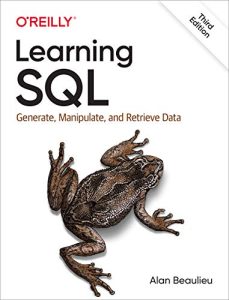
SQL is still the most used programming language in our times by professionals who are dedicated to the creation and management of databases. So many people are studying it to improve their knowledge and job skills in this regard. The third edition of Learning SQL from Alan Beaulieu is a great option for data scientists who know a bit of the fundamentals and want to progress. It contains 377 pages which include enough content for anyone looking to learn the basics and have some hands-on guide.
The programmer Alan Beaulieu has developed this book with the aim that the reader can enter this world step by step until mastering said programming language. This edition is different from the second edition, where the author has updated part of its content, specifically the current database systems that are related to MySQL 6.0, Oracle 11g, and Microsoft SQL Server 2008. As you read, you will learn effortlessly and master all the fundamentals of the SQL language.
What we liked:
- Excellent for mid-level programmers;
- Ideal as a reference guide to SQL;
- It’s also great for novice programmers.
What could be better:
- There could be more exercises;
- Not for a complete beginner.
Features:
- Author: Allen G. Taylor
- Level of proficiency: Beginner
- of pages: 768
- Edition: 3rd edition (April 23, 2019)
- Publisher: For Dummies
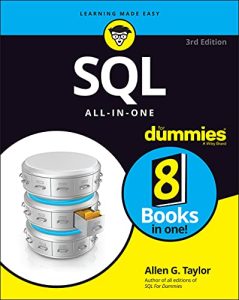
Are you looking for a detailed book for beginners in SQL language programming? This SQL All-in-One For Dummies from Allen G. Taylor is really good for dummies. It contains 768 pages. So you can consider this an encyclopedia of SQL programming. Even a dummy will find all the information they need.
It is a good guide for novice and seasoned database professionals. There are tons of information on the SQL database, and how to control and maintain SQL. The book talks about SQL Concepts; SQL Queries SQL and programming; database development; relational Database Development; SQL, XML, & JSON, and more.
What we liked:
- It’s very detailed;
- The book includes eight well-chaptered books or topics;
- Easy to understand.
What could be better:
- Contains unexplained concepts.
Features:
- Author: Itzik Ben-Gan
- Level of proficiency: Beginner/Intermediate
- of pages: 464
- Edition: 3rd edition (August 3, 2016)
- Publisher: Microsoft Press
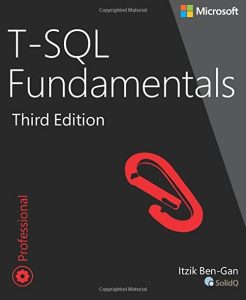
Itzik Ben-Gan’s T-SQL Fundamentals is our choice of the best book for developers who want to learn Transact-SQL. Released and published by Microsoft Press in 2016, this 3rd Edition contains all the fundamentals of the language. It is a book aimed at beginning developers and computer scientists who want to work with a relational database management system, better known as “RDBMS” to store and manipulate data.
The author’s goal is to describe the most used commands of the SQL language to allow the reader to quickly take charge of a relational database and be able to create tables, query them, modify them, insert and delete records. Each chapter deals with a subdivision of SQL, the creation and manipulation of tables, the data management of these tables, paging functions, data security, transactions, PL/SQL elements, and more.
What we liked:
- The content is not too short, not too much;
- It covers advanced data-query subjects;
- The book explains T-SQL’s roots and logic.
What could be better:
- The author sometimes explains simple concepts with complex examples;
- Could be even more comprehensive.
Features:
- Author: Joel Murach
- Level of proficiency: Intermediate/Advanced
- of pages: 674
- Edition: Illustrated edition (April 1, 2020)
- Publisher: Mike Murach & Associates
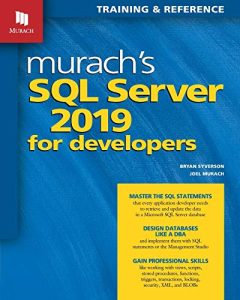
This is one of the best SQL server books online and the best for advanced developers in our opinion. Researched and written for those training to become an application developer or those who are already a developer but want to delve deeper, this SQL Server Book from Joel Murach is the latest edition.
It’s very comprehensive and written for intermediate and advanced developers. It’s self-published by the writer and his associates and well-illustrated. This edition presents all the SQL statements needed for retrieving and updating data in a database. It also shows readers the easy method to implement a database design and how they can handle views, stored procedures, scripts, triggers, functions, transactions, XML data, and security, among other database features.
What we liked:
- It’s a good book for advanced developers;
- Handy for teachers who need a book to teach SQL servers;
- Well-formatted, illustrated, and written.
What could be better:
- There could be more examples programmers can develop.
Features:
- Author: Ben Forta
- Level of proficiency: Beginner
- of pages: 256
- Edition: 5th edition (December 10, 2019)
- Publisher: Sams Publishing
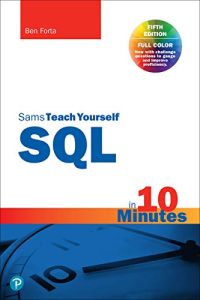
Sams Teach Yourself from Ben Forta is our best book for beginners looking to learn from scratch. It’s a short book for those who want to learn the fundamentals or concepts of SQL programming in quick time. The writing style of the book is great. The book is not boring or tiring to read. It addresses the subjects in the correct depth and with good explanations.
The size of the book is not much. But this book shows that it is possible to teach concepts clearly without going too long. We recommend it to any novice programmer who has never had contact with SQL, or to the programmer who already uses SQL and wants to deepen or fill gaps in their knowledge of SQL.
What we liked:
- It’s ideal for beginners;
- The book starts with basic SQL concepts and widens the scope;
- Explains simple data retrieval methods.
What could be better:
- Not comprehensive; only deals with concepts.
Features:
- Author: Anthony DeBarros
- Level of proficiency: Beginner
- of pages: 427
- Edition: 2nd edition (January 25, 2022)
- Publisher: No Starch Press
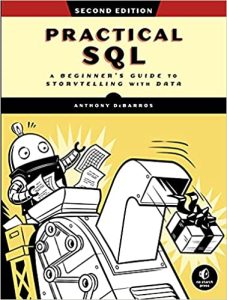
Practical SQL is our best easy-to-understand book. This Anthony DeBarros’ Second Edition is also one of the best books for learning SQL. It is a beginner-friendly but fast-paced guide to SQL that covers a lot of ground.
The only point that the book could improve is the way code examples are presented. The differences in commands (if any) for other database systems, such as PostgreSQL and SQLite, which are gaining a lot of space today should also be added. The book focuses only on MySQL. However, this is a valid decision of the author: it is the bank of relational data most used today.
What we liked:
- A good guide for beginners who want to learn from A-Z;
- Very comprehensive;
- Helps beginners analyze data like a pro.
What could be better:
- Code examples could be better presented.
Features:
- Author: Cathy Tanimura
- Level of proficiency: Intermediate
- of pages: 360
- Edition: 1st edition (October 5, 2021)
- Publisher: O’Reilly Media
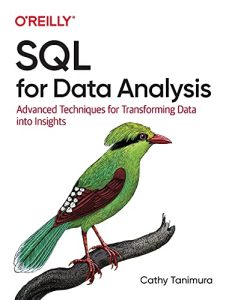
This is the best book for those who want to learn how to transform data to insights. Cathy Tanimura is the author of the interesting book, SQL for Data Analysis: Advanced Techniques for Transforming Data into Insights. Not too bulky in size, nor is it incomprehensive, the book contains all you need to learn SQL as a beginner.
This book is the ultimate course for creating and querying databases and can teach you how to use SQL in just a couple of days. It shows intermediate developers all the techniques for transforming data into insights. However, it comes at a premium as it’s twice as expensive as some books in this review.
What we liked:
- Shows the key steps needed for preparing data for analysis;
- Includes some realistic use cases of SQL;
- Good for beginners and those with intermediate experience.
What could be better:
- There could be more database or code examples;
- Pricey.
Features:
- Author: Jun Shan, Matt Goldwasser, Upom Malik, Benjamin Johnston
- Level of proficiency: Intermediate
- of pages: 540
- Edition: 3rd ed. edition (August 29, 2022)
- Publisher: Packt Publishing
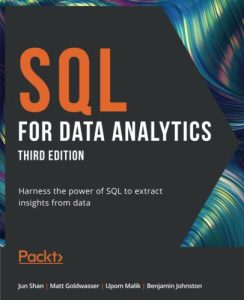
SQL for Data Analytics is the best comprehensive book for intermediate developers. For programmers who want to extract insights from data, this is a guide from multiple authors. So, you expect it to be very detailed. It’s co-written by Jun Shan, Upom Malik, Matt Goldwasser, and Benjamin Johnston and has up to 540 pages.
It’s not too complex for someone with intermediate experience, but it may not be enough for an advanced programmer. Beginners can get by with this as it comes with an intro to SQL and data analytics.
What we liked:
- There’s a lot of practical exercises for readers;
- Includes various statistical techniques for analyzing data;
- Good starting point to SQL.
What could be better:
- It’s a bit pricey, and expectedly so.
Features:
- Author: Thomas Pettit, Scott Cosentino
- Level of proficiency: Beginner/Intermediate
- of pages: 726
- Edition: April 29, 2022
- Publisher: Packt Publishing
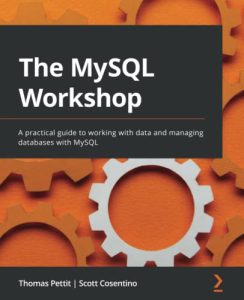
The MySQL Workshop is our best option for those aiming to go into database developing. It is a very comprehensive book by co-authors, Thomas Pettit and Scott Cosentino. It’s a good book for starters and those who want to do their knowledge to become an intermediate data scientist and beyond.
The book has been divided into about 15 chapters to facilitate its study. They are developed in an extensive way where the reader and student can both visualize the structure and practice in each section.
What we liked:
- It’s very detailed; contains 726 pages;
- Covers topics relating to SQL and database management;
- Ideal for beginners looking to level up.
What could be better:
- Despite the depth of the book, it’s not detailed enough for advanced users.
Things to Consider
Anyone who wants or has to deal with the subject of databases will not be able to avoid the database language SQL in the short or long term. In addition to some basic knowledge of Excel, everyone should also be able to demonstrate some knowledge of SQL. The SQL books are aimed at beginners as well as professionals and at all those who want to delve deeper into the subject. We’ve introduced you to some SQL book recommendations that you should have in your collection. And here in this guide, you’ll see what to consider when purchasing out of those selections.
What’s Your Level of Proficiency?

First, you have to be honest enough to know your level of knowledge and experience to get a book that matches your needs. Most books in their descriptions will tell you whether the book is suitable for a beginner, intermediate reader, or advanced programmer. We’ve done the same here in the review too.
Beginner
SQL All-in-One For Dummies will be great for pure beginners. Sams Teach Yourself SQL and Practical SQL, 2nd Edition from Anthony DeBarros are also ideal for learning from scratch.
Intermediate
Those who know the concept and want to deepen their knowledge can start with the third edition of Learning SQL from Alan Beaulieu.
Advanced
The best book for advanced SQL developers would be Murach’s SQL Server 2019 for Developers.
These books on the fundamentals of the SQL language are intended for developers and novice computer scientists called upon to work with a Relational Database Management System (RDBMS) to store and manipulate data.
By the way, SQL stands for “Structured Query Language” and is a language used to perform database queries. But be careful, it is not a programming language but a query language! It is a language for building powerful relational databases. You will learn all the techniques to design and administer a database, and even to create Internet databases.
SQL is a computer language used to operate databases. It generally allows the definition, manipulation, and security control of data.
In practice, the SQL language is used to create tables, add records in the form of rows, query a database, update it, or even manage the rights of users of this database. It is well supported by the vast majority of database management systems (DBMS). Created in the early 1970s by Donald D. Chamberlin and Raymond F. Boyce, both at IBM, the SQL language is now recognized as an international standard.
What Are Your Goals?
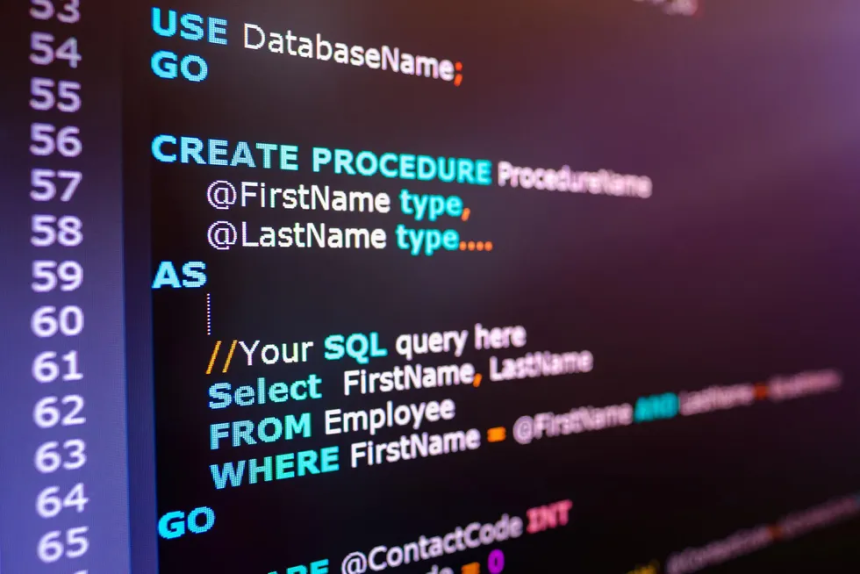
The goals you want to achieve from learning SQL will also determine what book you choose to read. SQL is the basis of a lot of programming jobs. And the most requested and highest-paid SQL jobs are:
- Data Analyst and Data Scientist: In this case knowing SQL is essential. It is used for accessing, cleaning, and analyzing data. Data Analysts must be good at recognizing patterns on huge amounts of data. Therefore, data analysis-focused books like SQL for Data Analysis by Kathy Tanimura or SQL for Data Analytics will be suitable for these readers.
- Database Developer: A database developer has to manage and create the database and usually interact with programmers. Excellent SQL knowledge is required for this job and Murach’s SQL Server 2019 for Developers will come in handy for those with this goal.
- Database Administrator: Database administration deals with the management of the database at the architectural level. It manages the installation on the servers, performance, security, creation of users and privileges, and so on. Murach’s book will also be suitable for these readers.
- Software Developers: Software developers must have knowledge of SQL to be able to execute queries, both simple and complex. SQL in 10 Minutes, SQL All-in-One for Dummies, and Murach’s SQL Server 2019 are all recommended books.
Is the Book Up to Date?
Pay attention to the release date of the book and the edition. You can’t be looking to learn data analysis and SQL programming in today’s industry and start with a book written in 2010. You should choose books released recently such as SQL for Data Analytics or The MySQL Workshop. There’s bound to be a big information gap in those released a long time ago.

Who’s the Author?
This is perhaps the most important criterion. You should do your research on the author, their experience, and background before buying.
The writer of our Editor’s Choice book, SQL: 3 Books in 1, Mark Reed is our favorite author. He is a senior software engineer and programmer. He has written quite a lot of best-selling programming books. He wrote one of the best C# books, C#: The Ultimate Beginners Guide to Learn C# Programming. He has also written multiple books considered some of the best Python books.
Reed is the author of more than 170 publications and 25 patents and has given more than 250 conferences. Reed received his Ph.D. in physics from Syracuse University in 1983. He was with Texas Instruments from 1983 to 1990, where he demonstrated the first nanocrystal device. He has been at Yale University since 1990, where he holds the Harold Hodgkinson Chair in Engineering and Applied Science.
Other authors versed in the authorship of SQL books are Ben Forta, Alan Beaulieu, Anthony Molinaro, Walter Shields, Sylvia Moestl Vasilik, Anthony DeBarros, Thomas Nield, Itzik Ben-Gan, and Stéphane Faroult.
FAQs
Can I learn SQL by myself?
The answer to the second question is: yes, you can! Anyone can start learning SQL by themselves. Don’t think that it is difficult to learn, on the contrary. It is a very simple language that is taught even to novice people who do not know to program.
How quickly can I learn SQL?
You can learn the basics of SQL in two to three weeks, and you’d be able to perform exercises. With some books, you can learn them on a weekend. Although these will only give the reader the concept. Learning is continuous and not bound by any timeframe.
What are basic SQL skills?
Some basic skills to learn as an SQL developer are Microsoft SQL server, database management, PHP skills, SQL Joins and indexing skills, OLAP skills, and more. These skills are not needed for learning SQL but to practice as an SQL programmer. So your learning activities should give you these skills.
Our Verdict
Our Editor’s Choice is the SQL: 3 books in 1 from Mark Reed. It’s an in-depth but explanatory book that can take a beginner to the expert proficiency level in quick time.
The SQL QuickStart Guide by Walter Shields is one of the best SQL books for beginners. Readers will have a handy guide to managing, analyzing, and manipulating data with SQL.
Learning SQL from Alan Beaulieu is one of the best SQL books for programmers with intermediate experience. It’s a great option for data scientists who know a bit of the fundamentals and want to progress.
References:
https://bootcamp.berkeley.edu/resources/coding/learn-sql/
https://www.businessnewsdaily.com/5804-what-is-sql.html
